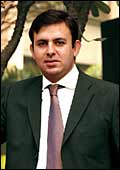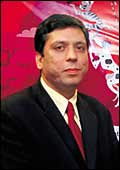|
 Mutual
funds (MFs), which pool people's money to make collective investments,
were meant to make life easy for retail investors. Their central
promise of relief: no stock-picking headaches. Remember those days?
Well, things change. And how. Now investors complain of mf-picking
headaches, and they're not faking it either. It's understandable.
So fast and furiously have funds proliferated in India over the
past decade or so, that knowing your way around the maze is a skill
in itself. Mutual
funds (MFs), which pool people's money to make collective investments,
were meant to make life easy for retail investors. Their central
promise of relief: no stock-picking headaches. Remember those days?
Well, things change. And how. Now investors complain of mf-picking
headaches, and they're not faking it either. It's understandable.
So fast and furiously have funds proliferated in India over the
past decade or so, that knowing your way around the maze is a skill
in itself.
Counting both open- and close-ended schemes,
the Indian investor has a choice of some 400 schemes. Add optional
diversity within schemes (dividend, growth, bonus, et al), you have
over 1,000 choices, as if all the other terms (growth, value, blend
and so on) were not complicating enough.
So what, alas, does an ordinary simplicity-seeking
investor do? Consider the following options.
Fund Of Funds
This describes a fund that invests the pooled
corpus in a portfolio of other MFs (usually five or more), resulting
in some rather wide diversification. To gain the most from this
idea, you must go for a fund of funds that invests in MFs across
the industry on the basis of merit, rather than just in funds promoted
by its own fund house (a common practice).
"The tax-advantage if you follow this
route is also enormous," adds Ajay Bagga, CEO, Kotak Mahindra
Mutual Fund. For example, the investor doesn't have to pay any tax
when money reallocation happens (usually at the end of every quarter),
since that's not a transaction in which the investor has directly
participated.
Another advantage: you can start with small
sums of money. Even a thousand rupees, in some cases, is enough
to get yourself a fund of funds. Of course, it will not relieve
you of all investment decisions. You must take your own decision
on when to enter and exit the fund-so you must have an investment
strategy of your own of some sort, and must keep an eye of the broad
Sensex direction. That's inescapable.
Portfolio Management Services (PMS)
 |
 |
 |
| MF gurus (from L to R) Bajaj
Capital's Rajiv Bajaj, Kotak Mahindra's Ajay Bagga and Parag
Parikh's Nimish Shah |
Don't be surprised, but it's true. Now portfolio
management services (PMS) are available to mf investors as well.
How does this work? In effect, like a personalised fund of funds.
You give money to the PMS agency, which tailors an mf portfolio
for you to suit your specific needs (in terms of risk capacity and
return requirements, mainly). The portfolio is shuffled around by
your PMS manager at frequent intervals, to ensure your goals are
met. If it is focussed on your needs sharply enough, and your manager
is independent, it will beat the same-house bias that fund of funds
tend to have (they prefer their own schemes). "Most of the
fund of funds in India invest only in schemes from the same fund
house, defeating its very own purpose," alleges Sharad Shukla,
Head (Investment Advisory Services), IL&Fs Investsmart. To avoid
that altogether, "go only for independent research houses",
advises Nimish Shah, Director and CEO, Parag Parikh Financial Advisory
Services.
Like all specialised financial services of
this kind, you need big money for it (at least Rs 5 lakh). Otherwise,
the only drawback is its tax-inefficiency. Transactions are treated
as yours, specifically, which makes portfolio reallocations expensive.
| What you need to watch out for is any conflict
of interest between you and your advisor |
Personal MF Advisors
For absolutely personalised advice, you could
actually consult experts the way people do for other investments.
The advice, as with stocks, is offered on the basis of your risk
profile and investment horizon, and mf identification is done on
the basis of returns' consistency, and the ability to meet financial
goals. "For example, a fund might be performing very well,
but it might not be suitable for an investor if the volatility is
very high and that does not match his investment profile,"
says Amit Sah, Director (Marketing), Global Consumer Group, Citigroup.
Needs keep changing too as you go along. "An
overall wealth creation strategy is required," says Rajiv Bajaj,
Managing Director, Bajaj Capital, "as the financial products
that are ideal for you now may not suit you after some time."
Investment banks and other financial groups
offer such advice as part of their private banking operations to
high net-worth individuals. Mutual fund distributors offer such
advice to smaller investors too. What you need to watch out for,
again, is any conflict of interest (between the advisor and you).
And remember, tax-inefficiency is applicable here as well. That
apart, the advice could help.
Sectoral Savvy
Sector-specific mutual funds are specialised
vehicles. Does that help performance?
By Shilpa Nayak
 |
| Pharma funds: Particularly focussed limelight |
Sectoral
mutual funds (MFs), went the logic, should do well simply on account
of knowledge specialisation. So, have they? For the most part, yes.
Sectoral fund investors have worn a wide smile for some time now.
But this could be because they happened to pick the hot and happening
sectors, rather than any special expertise on the part of their
fund managers. To test just how well funds have actually performed,
compare their returns with that of benchmark indices specific to
their sectors.
The most interesting story of index-beating
lies in the FMCG sector. The BSE FMCG index gave a negative 1.1
per cent return over the past one year. But almost all FMCG funds
have delivered excellent returns. Fund managers are quite discerning
in their picks, it seems.
Pharma funds have also beaten the sectoral
index. The BSE HC (healthcare) Index returned 26 per cent over the
past year, but SBI Pharma Fund outperformed this index heartily,
delivering a return of 65 per cent over the past year. Yet, argues
Sandip Sabarwal, Fund Manager, FMCG & Pharma Funds, SBI Mutual
Fund: "Since some indices are overweight on a few top companies,
investors could track peer group funds apart from the sectoral indices."
The banking, PSU, and oil and gas sectors have
similar stories to tell. A curious case is that of it sector funds.
Now, these funds have also done rather well. They topped the entire
equity funds category. Yet, they failed to beat the BSE IT index.
They returned between 29 and 44 per cent over the past six months,
while the BSE returned in excess of 46 per cent. How come? The weightage
assigned to top tech stocks-namely Infosys, Wipro, TCS and Satyam-in
the free-float BSE IT index is 90 per cent (with Infosys alone 50
per cent). And these have been the top performers too, even as fund
managers preferred to diversify their holdings. Says Rushab Seth,
Head of Equities, Kotak Mahindra Mutual Fund: "Mutual funds,
by definition, are meant to diversify risk. If one skews the portfolio
in favour of too few stocks, one loses the objective of a fund completely."
|
